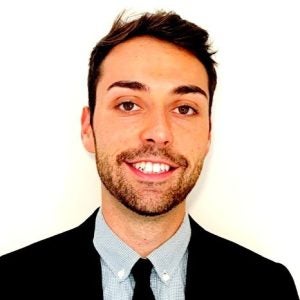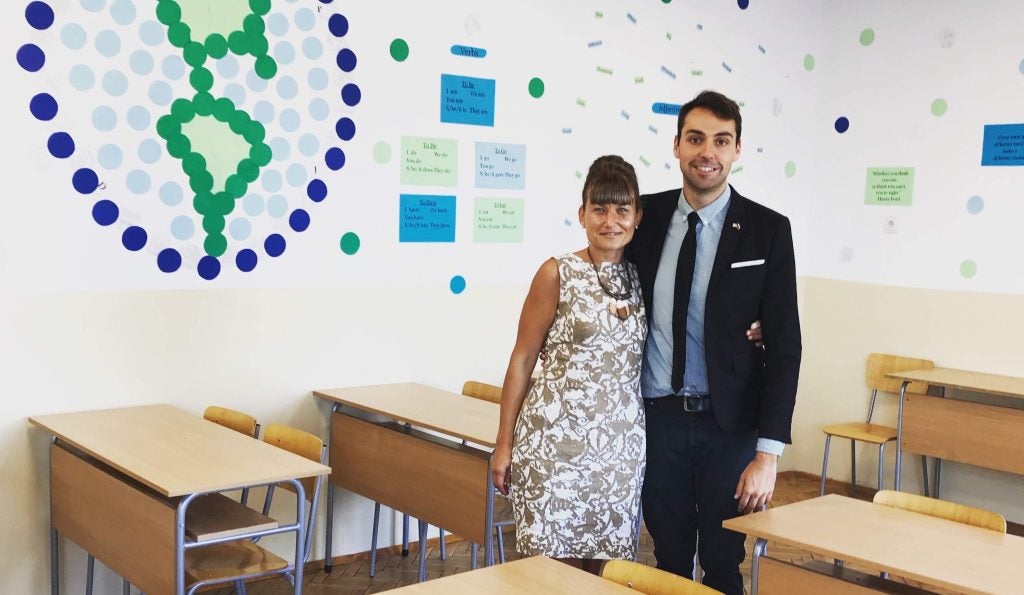
Let me introduce you to our second-year student, Keegan Scott.
Keegan Scott, originally from Delta, Ohio, is a 2016 graduate from The Ohio State University with a B.A. in International Studies and a minor in Turkish. After graduation, he taught English in the Caucasus region with the year-long Teach and Learn Georgia program. Subsequently, he received a Fulbright English Teaching Assistantship in Galabovo, Bulgaria where he continued his passion for cultural exchange for 3 years. In 2021, he received the Boren Fellowship to study Turkish. He has a particular interest in Turkey and Turkish affairs. He currently is interested in researching media, disinformation, and misinformation.
Thank you so much for joining me today. I know that your class is just getting started on your Capstone research projects. Why don’t we start with talking about your capstone.
Now I am looking at the second Nagorno-Karabakh War, but for my Diplomatic Studies Certificate, I am looking at even a bigger picture of what the U.S. can do, particularly public diplomacy and messaging. You know, a lot of my work was peer-to-peer cultural diplomacy, as for both Education USA in Turkey and the Fulbright Fellowship. But now, I want to look at what the media does in all these. How is it important, and why is it important? For my Capstone, I definitely want to use my Turkish and keep practicing and really seeing what is out there. I will be doing a comparative analysis of Sputnik Turkey, Voice of America, and other Turkish sources. My goal is to look at about ten articles during the two months of the second Nagorno-Karabakh conflict, and see if there are some sort of narrative art and any differences in reporting, identifying what the biases and goals are. In addition to focusing on Turkey, I want to step back and say to myself, “Okay, you know who knows a lot about Russia, Russian influences, and active measures, you should seek what those experts have to say.” I know that I am only looking at a piece of the pie, and certainly, there is a lot more to that. I am expanding the amount of sources that I am looking at and connecting with different folks who are much more familiar with Russian influence. I love working with Ambassador Yalowitz, one of my favorite professors. I was in his former Soviet Union class last semester, and I loved it as someone who had spent time in Georgia. It was great connecting with him; he is a wonderful mentor, and he has a lot of experience in the state department. Certainly, it is great to have him in my corner. So for my Capstone, in addition to analyzing sources in Turkish language, I want to learn from experts on Russia’s media influence and Russia-Turkey relations.
That sounds like a very interesting topic! Let’s talk about your overseas experiences. We know that you have several years of experience teaching English in Georgia and Bulgaria- could you talk about that?
Yes, so it is a little complicated. In 2016, I got a Fulbright as an English teaching assistant in Turkey, but unfortunately, as we know, Turkey had a failed coup in Summer 2016. A month before I was supposed to leave, it was canceled, so it was very sad for me, as someone who was really looking forward to Turkey. So instead, I taught a year in Georgia, with Teach and Learn Georgia, which is their government program. I was in north-central Georgia and living my best life teaching students and living with a host family. I loved it.
Then, I reapplied for the Turkish Fulbrights ETAship, but unfortunately, it was canceled again. However, there was an opening up in Bulgaria that offered two finalists, and I applied. This was very much within a week. They were looking for someone at the last moment, and it was a fast process, but I received it, and I was very excited. So, I was there in Bulgaria, not only for one year, not only for two years, but for three years [laugh]. Usually that is impossible. Programs are only allowed to go up to two years because obviously they want fresh faces and different people, but my situation was unique because it was a corporate-sponsored Fulbright. The issue is that the funding would always come after the Fullbright application cycle, so it made it easy for me. After I asked, everything just happened to work out, and I was able to stay for another year. I only know one person who has done this, and it was also in Bulgaria, so it is a unique title.

The next question that I wanted to ask you is how do you think your overseas experiences in Bulgaria and Georgia help you understand what you are studying and researching now?
Yes, 1,000%. I think most of my time, my four years abroad in Georgia and Bulgaria, of course, and having traveled to Turkey often, was eye-opening because I was someone who was very much looking at Turkey, honestly, pigeon holed. My focus was Turkey, and it was a bit narrow. Having lived in and traveled all over the Caucuses and the Balkans was really eye-opening for me to see the influence of Russia and Turkey as the spheres. When I was in Georgia, I lived not that far from the Ossetian conflicts. It was also during their 2016 elections, so it was a really interesting time to see the rise of the Georgian dream which very much took an autocratic turn now comparatively to them.
For example, when I took Ambassador Yalowitz’s class, Conflicts in the Former Soviet Union, I was shocked. You know, I had been on the ground, and I thought that I understood the situation, right? I had these experiences. However, when I actually learned about it, talking about higher levels, political bureaucracies, and their interactions, I was fascinated. I understood it so much better because I had that context of having lived in and visited these regions. It provided me with such a basis, having lived in those conditions. Having lived in my Soviet bloc apartments in Bulgaria, I understand why people are disenfranchised in Bulgaria with the EU. The vaccination rates are low because of the spread of information. The idea of critical thoughts and analysis isn’t really taught in the schools, so as a teacher and having been in these situations, I got to see so many layers that I would not have appreciated, if I simply just read it in the U.S. It was really nice now being able to reflect upon that in my studies.
What would you say about your experience doing Turkish studies at CERES? What do you think CERES has prepared you for a further career or to do further research on Turkish affairs or anything?
Oh, so much. I think so much context has been put in my study. I mean, as a Turkish scholar, I was never thinking about Russia explicitly or interested in it, but I have gotten so much context truly at CERES in it, in Eastern Europe, and in Eurasia. I feel that as a Turkish scholar, I would not have gotten that anywhere else; it is really a holistic view of what the spheres of influence are, and how we can fold in places like Iran or the Middle East. I have been prepared to have discussions with European scholars, with Russian scholars, and with people focused on the Caucasus. Everytime that different people talk to me, I have a context; I have a foundation of these regions, these influences, and how we are all so connected. I think CERES really brings it out, and, you know, as much as I claim to be a Turkish scholar, I can’t after CERES [laugh]. I am truly an Eurasianist, a global scholar because I have that analytical ability and knowledge to connect the dots from all over the region. I think studying area studies is so important because so many trends are global. Give you an example. I loved my class with Professor Dougherty on youth policy in Russia. I am focusing on Turkish youth, too, and so many overlapping and contrasting things just kept popping up in different ways. I think CERES really has given me the Eurasian context for global issues.
(This interview has been edited for length and clarity.)